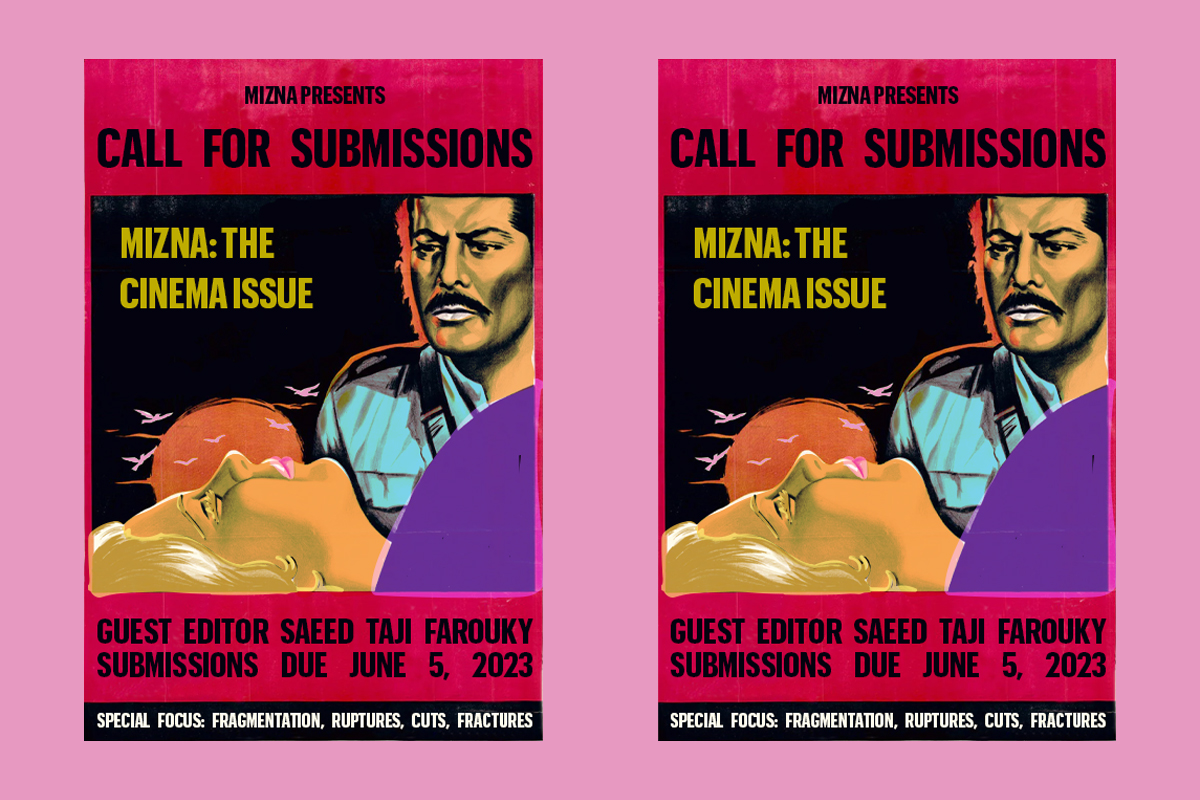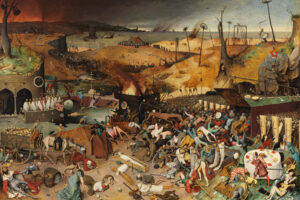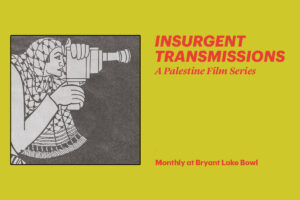
April 6, 2023
Call for Submissions: The Cinema Issue
Call for submissions, Mizna: The Cinema Issue, Winter 2023. The deadline has been extended to June 26, 2023.
Mizna is a critical platform for contemporary literature, film, art, and cultural production centering the work of Arab and Southwest Asian and North African artists. For more than twenty years, Mizna has been creating a decolonized cultural space to reflect the expansiveness of our community and to foster exchange, examine ideas, and engage audiences in meaningful art.
For our winter 2023 issue, guest-edited by filmmaker, educator, and writer Saeed Taji Farouky, we seek works which explore the relationship between moving image–making and writing and what the two practices can offer one another.
Film is cast by the projector at 24 frames per second. Every frame is a still image, constantly interrupted by the frame’s edge. They are fragments of movement that create the illusion of continuity and persistence of vision, if we allow ourselves to believe in the illusion. In this themed issue, we invite submissions to formally and/or conceptually explore moving images through the history of SWANA cinema, poetry films, analyses of film programming, writing by filmmakers, film archiving, screenplays, audition calls, end/title credits, movie posters, storyboards, title cards, movie tickets, movie house architecture, etc. which are encouraged to respond to a specific focus of “fragmentation”.
The SWANA region has a history of fragmentation provoked in part by colonialism, occupation, diaspora, and war. For many of us, it defines our nations and identities. At the same time, fragmentation can generate a new way to describe ourselves and our artistic forms. It defines our storytelling, too. The opening lines of traditional Arab folktales, كان ياما كان, tell us “It was, or it was not.” The narrative is cut in two, somehow true and untrue at the same time, and this unstable contradiction is part of the story’s magic. Similarly, film strips were cut and pieced together to form a continuous montage. A movie ticket is ripped from a continuous roll, allowing moviegoers to enter another world for a few hours.
Submissions can approach fragmentation, ruptures, cuts, fractures, or fissures in a myriad of ways. They could be deliberately fragmented, designed to resist or heal fragmentation, or explore what fractures, ruptures, and wounds could generate anew. This edition of Mizna will challenge linear narratives and deterministic storytelling while writing with cinema.
We encourage people to take an expansive view of this theme, interpreting it as literally or conceptually as fits the vision of their particular submission.
SUBMIT YOUR WORK HERE
Contributors do not need to identify as of Arab/SWANA descent, provided their work is of relevance to or in dialogue with the social realities of the SWANA/Arab region or community. Submitters may also decide to expand these social realities. Simultaneous submissions are accepted, though we ask to be notified as soon as possible if the submission is accepted elsewhere. There are no submission fees. Full submission guidelines available here.
Selected contributors receive a $200 honorarium, a one year subscription to Mizna, and five copies of the issue.
Submissions are due Monday, June 26, 2023 at 11:59pm CT.
About the Guest Editor

Saeed Taji Farouky is a Palestinian / Egyptian / British filmmaker, film educator, and writer. He has been making work around themes of post-colonialism, conflict, and migration since 2004 and runs a radical, free film school that supports young filmmakers from marginalised communities. His most recent film, “A Thousand Fires,” was the opening film in Locarno’s Critics’ Week 2021, and was selected for the main competition at IDFA. His previous documentary “Tell Spring Not to Come This Year” premiered at Berlinale 2015 where it won the Panorama Audience Award and the Amnesty International Human Rights award.












